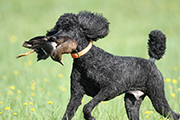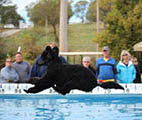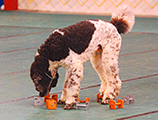Fact Sheet
HIP DYSPLASIA (HD)
Toy, Miniature & Standard.
Malformation of the hip joint in which the ball and socket do not properly fit together.
Mildly dysplastic dogs may not exhibit any outward signs. Moderate to severe cases may exhibit rear end lameness and/or discomfort when getting up. Arthritis often occurs over time from wearing on the hip joint.
While most dogs with HD do not have clinical signs, those who do are first affected between 5 and 10 months of age. In those who do not, the signs may not be observed until later in life. The clinical signs of HD may include:
- a reluctance to go up/down stairs
- difficulty in rising from a sit/down position
- bunny-hopping gait when running
- lameness after exercise, or a wobbly gait
- a clicking sound when walking
Polygenic (multiple genes with differential weights working additively toward a threshold of manifestation) in addition to those genes interacting with environmental factors. Multiple genes are contributed by the parents in such a way that two HD affected dogs with similar symptoms can have different inheritance profiles. There need not be any common genes or shared environmental factors between the two affected dogs.
Radiograph (x-ray).
Varies, but there are two groups among the affected:
- Young dogs 5 to 10 months, and
- Older dogs with chronic degenerative joint disease.
For Orthopedic Foundation for Animals (OFA) Certification, 24+ months. For OFA preliminary evaluation, younger than 24 months. OFA’s three major categories and seven ratings are: Normal (Excellent, Good, Fair), Borderline, and Dysplastic (Mild, Moderate, Severe).
PennHIP 16+ weeks. PennHIP reports the breed-based hip percentile score. A Poodle with a score of 95 indicates that he is in the top/best 5 percent among Poodles, while another Poodle with a score of 30 indicates that he is in the bottom/worst 30% among Poodles.
Your best bet with treatment and supplements is to proceed thoughtfully, research various options on the web sites [e.g., OFA and American College of Veterinary Surgeons (ACVS) on HD), ask your vet a lot of questions or seek a second opinion. You may also want to consult with an orthopedic specialist when surgical intervention is a possibility. Surgical intervention may be required for severely dysplastic dogs.
The principle for prevention/reduction in HD incidences is a careful selection of breeding stock. Every dog being used in a breeding program should have its hips x-rayed prior to being bred. Dogs who have normal hips should be considered for breeding, and a dog with fair hips but with a good family history for hips and over 75% of its siblings being normal is a good prospect. However, a dog with excellent hips, but with a weak family history with less than 75% siblings with normal hips, is a poor breeding prospect. Dogs who produce dysplastic offspring are carriers for hip dysplasia, although they may have normal hips themselves. OFA recommends the following breeding principles and they emphasize the importance of evaluating the HD incidences in the breeding stock’s family history, both in its depth (grandparents, great grandparents) and in its breadth (siblings, half siblings, lateral relatives). The environmental factors alone do not trigger HD, but they may interact with the existing genetic susceptibilities to HD (e.g., high caloric intake, over supplementation in young dogs, and being raised on slippery floors).
OFA’s recommended breeding principals include:
- Breed normals to normals.
- Breed normals with normal ancestry.
- Breed normals from litters (siblings) with a low incidence of HD.
- Select a sire that produces a low incidence of HD in his progeny.
Dr. Jerold Bell’s breeding recommendations for polygenic diseases using HD as an example.
PennHIP FAQ: http://www.pennhip.org/
OFA write-up on HD: https://www.ofa.org/diseases/hip-dysplasia
The information contained in these documents is current at the time of this writing and is accurate to the best of VIP’s knowledge.
This information has been provided to you at no charge. You are free to use it provided it is used in its entirety with no changes or alterations and that the copyright remains intact. If you have found this information to be helpful, please consider making a tax-deductible donation to:
Versatility in Poodles
4061 Highlands Rd
Franklin, NC 28734
To make a donation via PayPal, please click the Donate Button:
![]()
The contents of the www.vipoodle.org website, such as text, graphics, images, and other material contained on this site (“Content”) are for informational purposes only. The Content is not intended to be a substitute for professional veterinarian advice, diagnosis, or treatment. Always seek the advice of your veterinarian with any questions you may have regarding the medical condition of your pet. Never disregard professional advice or delay in seeking it because of something you have read on this website!
If you think your pet has a medical emergency, call or visit your veterinarian or your local veterinary emergency hospital immediately. Versatility in Poodles and www.vipoodle.org do not recommend or endorse any specific veterinarians, products, procedures, opinions, or other information that may be mentioned on this website. Reliance on any information appearing on this website is entirely at your own risk.















